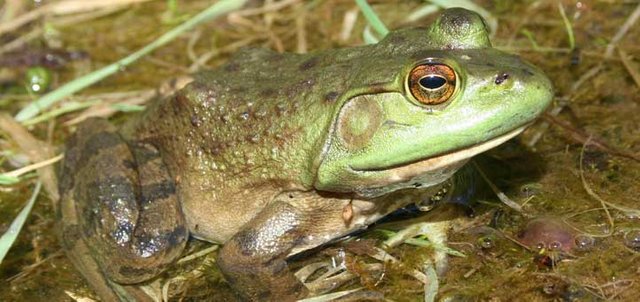The American Bullfrog (Lithobates catesbeiana) is North America's largest frog species... and one of the largest environmental concerns facing the western United States. Native to Eastern North America, the bullfrog is a large, aquatic frog that can grow up to 1 1/2 pounds when mature. They are voracious carnivores that are not picky about what they eat; if it can conceivably fit in their large mouth, it's lunch. Unfortunately, thanks to the actions of humans, these frogs have been introduced to Western North America, South America, parts of Europe and much of Asia, and they have become incredibly invasive. There are concerns that their increasing populations may outcompete native species of amphibians and upset the ecological balance as they are such prolific breeders and opportunistic predators. Today, many states and countries are working to halt the spread of these devastating frogs and help save the species they are putting at risk. However, a new study has revealed that controlling these invaders may be more difficult than previously thought.

For the purpose of the study, bullfrog eggs were collected from a seasonal, fish-less pond in Oregon's Willamette Valley and split into three groups. The first group was exposed to fish odor, to simulate the presence of predators nearby; the second group was exposed to both the fish odor and the scent of injured tadpoles. The final group, the control group, were not exposed to any smells. When the tadpoles emerged from the eggs, there were clear differences between those that had been exposed to predatory cues and those that had not. Those that were avoided predators more efficiently than those that were not exposed to predatory signals, hiding themselves behind black plastic inserts for protection. The differences weren't only behavioral; the tadpoles that had been exposed also grew more rapidly and to a larger size to avoid being eaten. In short, being exposed to predators even before they hatched made the young frogs harder to kill.
"These embryos can learn about new predators while they are still in the egg, and they behave and develop differently after they hatch based on that learning. If these frogs can learn about predators before they are even vulnerable to them, it makes it that much harder to limit their spread." - Tiffany Garcia, an aquatic ecologist in OSU's College of Agricultural Sciences Source
"When that predator smell was around in the tadpole phase, they knew what to do to be safe. They learn about the identity of predators that will pose a threat for them later in life." -Garcia Source

This is a huge blow for conservation biologists. In order to control the spread of bullfrog populations, we've had to rely largely on native predators; it is too risky to introduce new predators or pollutants to the environment to control them. However, if the frogs are able to adapts and learn so efficiently and so early in their development, we may not be able to rely on predators curbing their numbers as much as previously hoped.
"They are what we call gape-limited predators. That means their diet is only limited by their size. That's why they can have such a strong impact in invaded ponds and why we are looking for ways to control their spread. It turns out they have more weapons than we originally thought that make them very good invaders." -Garcia Source

Article Link: https://www.sciencedaily.com/

I've dissected bullfrogs to examine them for parasites and it is amazing how much food some of them have in their stomachs. I've seen them with stomachs so distended from multiple crayfish carapaces that I was surprised they were still able to move.
Downvoting a post can decrease pending rewards and make it less visible. Common reasons:
Submit
It is impressive whoever eats a bird 😨
Downvoting a post can decrease pending rewards and make it less visible. Common reasons:
Submit
WHAT!?! they eat birds... or maybe it thought it was a big fly?
Downvoting a post can decrease pending rewards and make it less visible. Common reasons:
Submit
Fish, bugs, small mammals, snakes, lizards, birds, bats, other frogs...anything they can catch they will eat!
Downvoting a post can decrease pending rewards and make it less visible. Common reasons:
Submit
WHAT!?!?! My whole life, I had no idea.... such trickery... Mind blown!
Downvoting a post can decrease pending rewards and make it less visible. Common reasons:
Submit
All animals have a set of survival instincts in their DNA. So before they take the first step, they already have some basic information.
Downvoting a post can decrease pending rewards and make it less visible. Common reasons:
Submit
I am a tree planter getting ready to plant!
Thanks to @kedjom-keku your post was upvoted with 10% of my voting power.
I need just 824 Steem Power to achieve 7,500 SP and
start planting trees in Cameroon.
Thanks a lot!
Downvoting a post can decrease pending rewards and make it less visible. Common reasons:
Submit